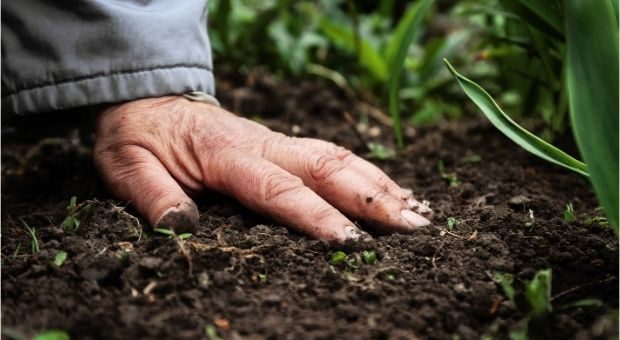31
Mar
Traditionally-Produced Compost Improves Soil, Outperforms Synthetic Chemical Fertilizers

(Beyond Pesticides, March 31, 2022) Composts produced using traditional ecological knowledge create healthier, more fertile soil than industrial, chemical-based fertilizers, according to the findings of a recent study published in PLOS Sustainability and Transformation. As the dangers posed by industrial agriculture become increasingly apparent, organic and traditional practices show a time-tested path toward a sustainable farming future. According to study author Seema Sharma, PhD, “The research was already there because the ancient people did their research long ago,” she said to EOS. “But when it comes to the scientific community, you need research that is in a peer-reviewed journal and then finally verified.”
The study focuses its comparison within the Kachchh district, a semi-arid farming area of Western India that experiences erratic rainfall and has higher salt levels in its soils than much of the rest of the country. Twenty farms were chosen based on their fertilizer management practices, split between farmers employing traditional composting techniques and those using chemical fertilizers. For the chemical farms, an initial application of animal-based manure was applied, and synthetic sources of nitrogen (urea) and phosphorus (ammonium phosphate) were then spread as a top dressing at a rate of roughly 60kg (132lbs)/ha approximately 20 days after sowing. Traditional farms utilized a compost known as Jivamrit-S (Jeevamrutha), comprised of cow manure, cow urine, jaggery (an unrefined cane sugar), gram flower, and soil that is then fermented in a compost pit. This material was applied once a week for the two weeks after planting, and subsequently watered in. Over the course of three years, farm soils were tested before, during, and after harvest.
The study measured five variables of the soils on the twenty farms, including water holding capacity, bulk density (an indication of how compact the soil is), electrical conductivity (a measure of salts in soil), soil organic matter, and pH. The maximum water holding capacity of traditional farms was on average higher (at 47.5%) than soils amended with chemical-based fertilizers (at 38%). Bulk density recorded lower values in traditionally managed soils (1.04 grams per cubic centimeter) than those chemically treated (at 1.31 grams per cubic centimeter). Most unsurprisingly, traditional soils had lower levels of electrical conductivity (at 0.55 deciSiemens per meter) compared to those that applied salt-based, synthetic chemicals (at 0.69 deciSiemens per meter). Soil organic matter was higher in traditional soils (at 0.75% organic matter) than chemical amended soils (at 0.46% organic matter). pH tended to increase in soils that were chemically treated (averaging 8.1), while those amended with traditional composts recorded relatively stable soil pHs (averaging 7.3).
The study notes that traditional soils maintained their advantages over chemically treated throughout the course of the experiment, and even during a drought period in the middle of study period. “In the present scenario—where chemical fertilizers had already shown detrimental effects in the form of long-term soil fertility depletion, health concerns occurring due to chemical inputs to both the growers and consumers, environmental deterioration—ecologically sustainable agri-management systems are not a choice but a necessity,” the study reads.
A similar recent review of cropping practices in Chinese rice paddy farms also found a range of benefits conferred by traditional practices that were not seen under an industrialized, monoculture farming approach. By utilizing traditional techniques that integrate animals into rice farms, nutrient cycling improved, the animals reduced on-farm weed pressure, and total economic output increased by up to 7x in certain conditions. This study represented an “enhanced” version of the traditional approach utilized in this region, adding additional nutrients in the form of vegetable manures.
It is critical that more research be done on the current value of traditional cropping systems, so that modern scientific methods can be applied to further improve these approaches, say health and environmental advocates. They say this approach should form the foundation for future farming practices that are truly sustainable, providing an off-ramp from over-promised “silver bullet” solutions of the agrichemical industry—be they synthetic fertilizers, genetic engineering, toxic pesticide use, or the industry’s new focus on RNAi.
Dr. Sharma plans to conduct further research comparing the yields between farming utilizing traditional practices and those employing industrial approaches. “The farmers that I work with are now telling me that we have yields that are on par with the common system of chemical farming,” she told EOS. “But that study has to be done.”
For more information on the benefits of time-tested, traditional and organic practices, see Beyond Pesticides organic program page. Consider taking action today to ensure that organic maintains its separation from industrialized agriculture and continues its trajectory of continuous improvement.
All unattributed positions and opinions in this piece are those of Beyond Pesticides.











I like that you talked about how the traditional soil has maintained its advantage compared to chemically-treated ones according to a study. In that case, agricultural companies should invest in manure separation equipment wholesalers to create traditional fertilizers for their plants or crops. Doing so will mean that the soil will remain healthy even after you use them a lot to grow your produce.
May 30th, 2023 at 8:35 am